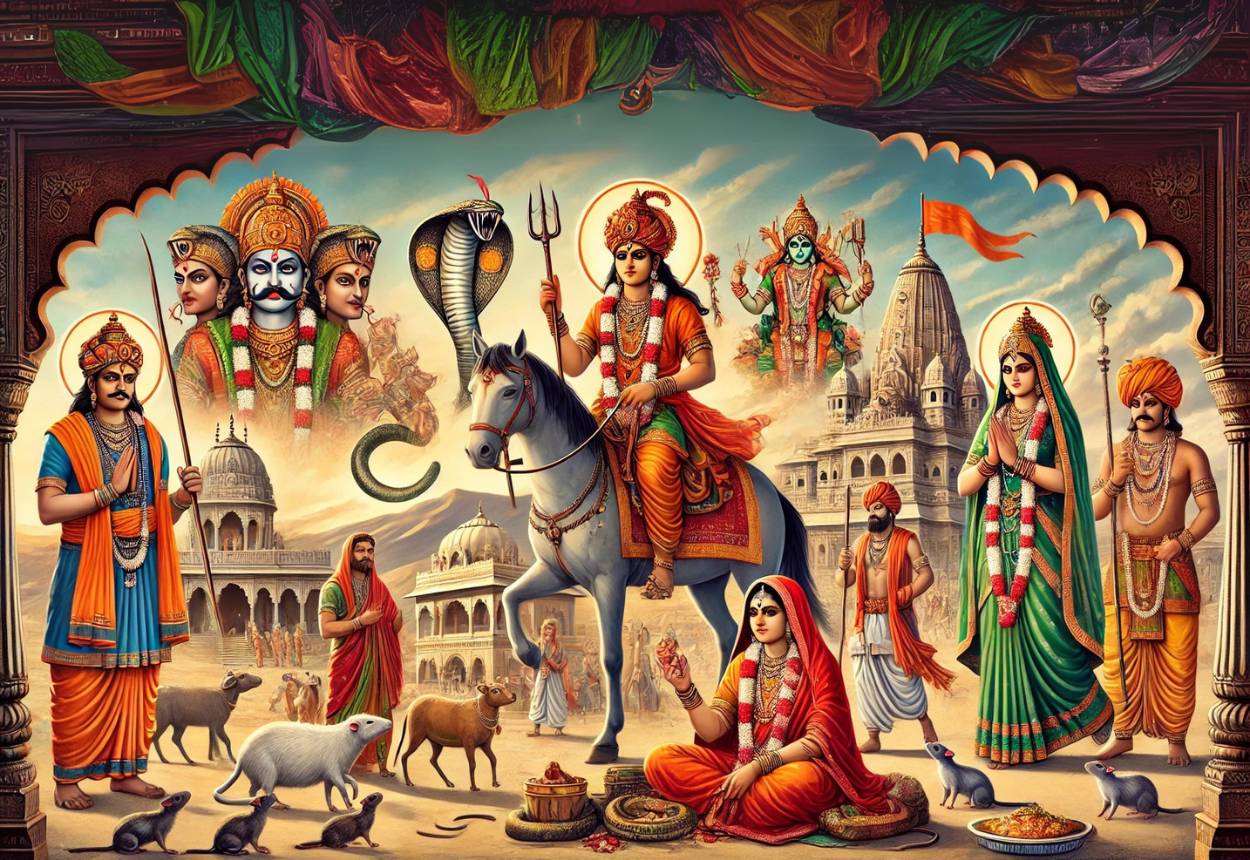Rajasthan, known for its vibrant culture, rich history, and glorious past, is also a land deeply rooted in spirituality and faith. Among its diverse traditions is the worship of Lok Devtas—local deities revered by communities for their legendary deeds, supernatural powers, and the protection they offer. These folk deities occupy a significant place in the lives of Rajasthani people, bridging mythology, spirituality, and daily life.
Who Are Lok Devtas?
Lok Devtas are spiritual figures or heroes who were either historical personalities or mythological characters. They are venerated for their acts of valor, sacrifice, or miracles. While mainstream Hindu deities are worshiped throughout Rajasthan, Lok Devtas have strong regional influences and are highly significant to local communities.
Most Popular of Lok Devtas of Rajasthan
| Lok Devta | Significance | Rituals and Practices | Major Shrine/Temple |
|---|---|---|---|
| Gogaji (The Snake God) | Protector against snakebites and other forms of harm | Devotees offer milk, sweets, and flowers; worship at goga-medi temples | Temples across Rajasthan |
| Pabuji | Guardian of cattle; a medieval folk hero revered for valor | Pabuji Ki Phad performances by Bhopas narrate his heroic tales | Local shrines in rural Rajasthan |
| Ramdevji (Baba Ramdev) | Promoter of social harmony and religious tolerance | Offerings of churma, coconut, and red clothes; annual Ramdevra Fair | Ramdevra Temple, Jaisalmer |
| Tejaji | Deity of valor and bravery; protector against snakebites | Observance of Tejaji Fair; offerings made at statues and shrines | Temples in rural areas |
| Karni Mata | An incarnation of goddess Durga; known for the temple of holy rats | Devotees offer milk, grains, and sweets to the holy rats at the temple | Karni Mata Temple, Deshnoke |
| Devnarayan | Protector of cattle; revered by the Gurjar community | Bhopas narrate extensive epics about Devnarayan’s life and deeds | Devnarayan temples |
Gogaji (The Snake God)
Gogaji, also known as Gogaji Chauhan or Gogaji Pir, is a legendary figure revered as a protector against snakebites. Temples dedicated to him, called goga-medi, can be found across Rajasthan, often marked with snake idols. Local devotees gather at his shrines during Goga Navami, performing rituals and singing hymns to seek his blessings.
- Rituals: Devotees offer sweets, milk, and flowers, believing that Gogaji’s spirit protects them from snake attacks and other forms of harm. His followers include people from diverse faiths, making his cult uniquely inclusive.
Pabuji
Pabuji, a medieval folk hero and warrior, is worshiped as a guardian deity of cattle. He is believed to have fought valiantly to protect the honor of women and cows. Pabuji’s tales are sung by Bhopas (folk singers) who recount his heroic feats through mesmerizing performances of Pabuji Ki Phad, a traditional narrative art form.
- Interesting Fact: In rural Rajasthan, Pabuji is invoked before undertaking long journeys or during significant community events. Devotees consider him a protector and provider of strength during adversities.
Ramdevji (Baba Ramdev)
Baba Ramdev, a 14th-century saint, is a Lok Devta venerated for his teachings of social harmony, equality, and religious tolerance. He is considered the protector of the marginalized and is worshipped by Hindus, Muslims, and Sikhs alike. His main shrine, the Ramdevra Temple in Jaisalmer, is a major pilgrimage site where devotees flock from all over India during the annual Ramdevra Fair.
- Rituals and Offerings: The offerings include churma, coconut, and red clothes. Devotees seek blessings for their prosperity and well-being, singing bhajans and reciting tales of Ramdevji’s miraculous powers.
Tejaji
Veer Tejaji is worshipped as a deity of valor and bravery. Known for his courage and his defense of cattle, Tejaji is widely revered among farmers and pastoral communities. Devotees believe he possesses the power to cure snakebites and other ailments. Statues of Tejaji are often found under trees, and his stories are told through ballads and folk performances.
- Festivals: Devotees observe Tejaji Fair, offering prayers to seek protection from snakes and other threats.
Karni Mata
Known as the “Rat Goddess,” Karni Mata is a prominent Lok Devta with a famous temple in Deshnoke, near Bikaner. The temple, renowned for its thousands of rats considered holy, attracts devotees who believe these rodents are reincarnations of Karni Mata’s devotees. She is worshipped as an incarnation of the goddess Durga.
- Belief and Rituals: Devotees offer milk, grains, and sweets to the rats. Sightings of the rare white rats at the temple are considered a blessing.
Devnarayan
Devnarayan is revered by the Gurjar community of Rajasthan. His legend is narrated through an extensive oral epic that spans numerous nights of singing by folk artists known as Bhopas. Devnarayan is believed to protect cattle and bring prosperity to his devotees.
- Cultural Significance: The tales of Devnarayan are a rich part of Rajasthani folklore, symbolizing justice, protection, and devotion.
Importance of Lok Devta Worship in Rajasthan
Lok Devta worship transcends mere religious practices; it symbolizes a strong connection to Rajasthan’s heritage, traditions, and identity. The tales of these deities often reflect the community’s history, moral values, and collective resilience. Festivals, fairs, and rituals centered around Lok Devtas bring people together, fostering a sense of unity and preserving their unique cultural heritage.
Conclusion
The Lok Devtas of Rajasthan are more than just deities; they are an embodiment of the people’s beliefs, fears, and aspirations. By venerating these spiritual heroes, the locals preserve centuries-old traditions and pass down moral stories to future generations. This devotion reflects the soul of Rajasthan—a state where culture and spirituality dance hand-in-hand, enchanting every visitor who witnesses it.


